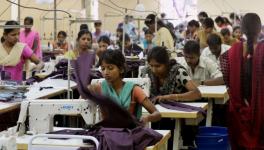To Make Them Work, TN Garment Workers Given ‘Illegal’ Pills to Ease Period Pain, Says Report

Representational Image. Image Courtesy: Deccan Chronicle
A Thomson Reuters Foundation investigation based on interviews with about 100 women in Tamil Nadu’s multi-billion dollar garment industry has found that all of them were given ‘unlabelled’ drugs at work for period pains with more than half complaining of their health suffering.
According to data from the government, about 40,000 garment factories and spinning mills across Tamil Nadu employ more than 3,00,000 female workers. But the true number could be far higher with thousands of uncounted informal workers. The women who spoke to Thomson Reuters Foundation -- most of whom were aged between 15 to 25 -- said they were always told to swallow the pills in front of the overseer. They were never told the name of the drugs or warned about possible side-effects.
The Foundation found that the pills given to the workers had no markings to show the brand, their composition or expiry date. Many of the women said it took them years to realise the damage the medication had done as they were never warned about side effects. Health problems range from depression and anxiety, to urinary tract infections, fibroids and miscarriages.
According to the report, one timekeeper, who spoke on condition of anonymity to protect her job, said that her role mainly involved providing painkillers to the 4,000 female workers under her watch. “The pills that are consumed the most are the ones for stomach ache, but I don’t know their names or their side effects,” said the woman.
Growing pressure from big brands on suppliers to deliver clothes quicker and at a cheaper rate, is fuelling exploitation in the form of lack of bathroom breaks to verbal abuse and has even taken gruesome forms of permanent physical damage because of the pills given to the women. Instead of providing sanitary pads or allowing longer bathroom breaks, women were handed pills that would stop their periods and were harassed for working slowly.
The investigation has exposed blatant loopholes in the implementation of India’s labour laws when it comes to the rights of women. Auditors and factory inspectors have observed that under Indian labour laws, factories must have one toilet for every 20 workers but – barring a few major export factories – most do not. Instead, in each factory, a supervisor known as the timekeeper, monitors workers’ hours and bathroom breaks and often manages a small medical dispensary for workers suffering from aches and pains. India’s Factories Act also requires medical dispensaries to be run by qualified nurses or doctors. However, the drugs were rarely provided by medical professionals, in violation of labour laws.
In response to these findings, an official from Tamil Nadu said the state would launch a project to monitor the health of its garment workers this year and collect data on how many suffered from work-related health problems. Officials from Tamil Nadu state and the Central government said they were not aware of pills being provided to workers.
Previously, a ground report by The Hindu Business Line highlighted how seasonal migrant women workers in Maharashtra’s Beed district are left with no choice but to resort to hysterectomies so that they don’t have to take time off from cutting cane during their menstrual cycles. Women as young as of age 25 are undergoing the surgery, as it has become a norm in the villages to remove the uterus after having two or three children. The cane-cutting contractors are unwilling to hire women who menstruate, said the report.
These reports have exposed the persistent trend of women putting their bodily functions on hold as the state does not provide them with social or job security. When this is clubbed with social stigma around menstruation and its association with reduced productivity of labour, it often makes women’s bodies as sites of exploitation by adversely impacting their bodies, mental health and hormonal balance. In addition, women in the informal sector also tend to face sexual exploitation at the hands of the contractors due to lack of basic facilities like toilets. These issues often remain underrated in the understanding of the rapid masculinisation of the Indian workforce.
The decision and ability of women to participate in the labour force is the outcome of various economic and social factors that interact in a complex fashion at both the household and macro-level. Based on global evidence, some of the most important drivers include education, fertility rates and the age of marriage, economic growth/cyclical effects, and urbanisation. In addition to these issues, social norms and, more importantly, labour factors such as these have also contributed to the reduction in the share of women in work participation.
India’s female Labour Force Participation Rate (LFPR)—the share of working-age women who report either being employed, or being available for work—has fallen to a historic low of 23.3% in 2017-18, meaning that over three out of four women over the age of 15 in India are neither working or not seeking work. (The age of 15 is the cut-off used for global comparisons by the International Labour Organisation.)
This statistic is explained by the persistence of barriers women face to enter the labour market and to access decent work. They face a range of challenges varying from access to employment, choice of work, working conditions, employment security, wage parity, discrimination and balancing the weight of work and household responsibilities. In addition, women are heavily represented in the informal economy where their exposure to risk of exploitation is usually greatest and they have the least formal protection.
Read Also: https://www.newsclick.in/Women-Wombs-Cane-Cutters-Beed-Hysterectomies
Get the latest reports & analysis with people's perspective on Protests, movements & deep analytical videos, discussions of the current affairs in your Telegram app. Subscribe to NewsClick's Telegram channel & get Real-Time updates on stories, as they get published on our website.
























